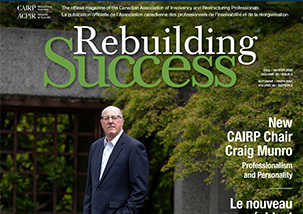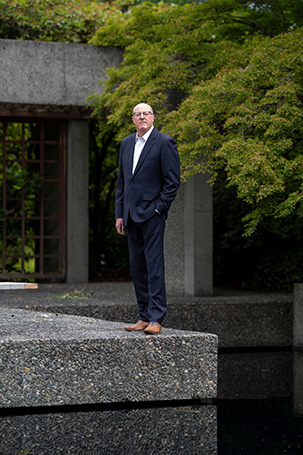Rebuilding Success Magazine Features - Fall/Winter 2025 > Craig Munro: professionalism and personality
Craig Munro: professionalism and personality
 |
By Andrew Flynn
A veteran of the insolvency profession with a wide array of experience, Craig Munro, CPA, CA, FCIRP, LIT, is truly qualified to take on the role of CAIRP Chair. A well-respected expert with decades of experience in corporate practice, Munro certainly has credentials to spare.
However, as impressive as his resume might be, what his peers see beyond the professionalism is a man of many layers – not all of which may be immediately apparent, thanks to a characteristic that is almost universally recognized by those who know him.
“Craig’s humility is one of the qualities I admire most,” says CAIRP’s outgoing Chair, André Bolduc, FCIRP, CPA, CA, LIT. ‘At first, you meet someone who comes across as a genuinely kind, grounded, and approachable individual. Then you quickly realize there’s much more depth – he has a sharp wit and a personality that shines through.’”
Bolduc describes Craig as thoughtful and pragmatic, yet always approachable and engaging. “He’s not someone who seeks the spotlight, but when the moment calls for it, he has the presence and charisma to step up and command attention.”
That balance of humility and presence is what stands out most. “Craig brings people together with ease – whether it’s in conversation, in decision-making, or in guiding a group forward,” Bolduc adds. “It’s a quality that earns both respect and trust.”
Past Chair Chantal Gingras, FCRIP, LIT, shares a long list of Munro’s qualities: “Craig has integrity, he’s ethical, hard working, open-minded, well spoken, an effective communicator, with strong decision-making skills.”
“I love Craig,” she says. “He’s the type of person who is calm and low key, but able to have fun or a great laugh.”
For his own part, Munro, who has worked on some of the most famous files in Canadian history – including Nortel, Air Canada, and SEFC Properties Ltd., the company that built the athletes’ village for the 2010 Vancouver Winter Olympics – says he’s learned that professional acumen is not enough. Humanity, he says, is an essential component of the job, whether it’s a consumer or corporate matter.
“In insolvency, I think you do need to have a high EQ [emotional quotient],” Munro says. “To sort of be able to read people and read the room, because while they're going through a very stressful period, quite often you need to rely on them to get your job done. These are people and they've got families just like you and bills to pay and everything else. It's not just financial distress. It's distress, period.”
“And so, you have to sort of find a way to be sympathetic, empathetic and respectful and still get what you need out of them to do your job.”
“I think the world of Craig and I'm delighted to hear that he's going to take up the role of Chair,” says past Chair, Larry Prentice, FCPA FCA, FCIRP, FIIC, who worked with Munro for many years both professionally and in a volunteer capacity at the Association, “And I have not a momentary thought that he will be anything but highly successful in the role.”
“I'd say one of his core strengths is his ability to mentally go around to the other side of the table and absorb what those people are thinking and how they're reacting,” Prentice says. “He just really gets the people side of things.”
Munro’s careful, measured approach and exceptional listening skills make him an ideal choice to lead the Association, says longtime volunteer and former CAIRP board member, Marla Adams, CPA, CA, CIRP, along with “his deep understanding and breadth of experience in the profession.”
“And most importantly, his passion for the work of the Association,” says Adams. “I believe the Association is very fortunate to have Craig step forward to take on the daunting and time-consuming role of Chair.”
Munro’s humility is evident in his response to such accolades. He is quick to point out that he is only one of many exceptional people who have served on CAIRP’s executive or committees over the past four decades. “I don’t think that I've ever seen a professional Association where people get so passionately involved for life,” Munro says.
“It's not like they come in for two years and then leave. I sit on committees, and quite often a name will come up that I'm not so familiar with, and then I find out, ‘Oh, this person's been on this committee for, several years.’ It's incredible. I've never seen an organization anywhere else; their enthusiasm never seems to wane, that's what gets me.”

Munro was born in Toronto and moved around central Ontario as a young boy. “My father worked with school boards, so we moved around a bit – five years in Belleville, five years in Oshawa, then moved back to Toronto.” He received a B.Sc. from the University of Toronto, then completed his Chartered Accountancy before beginning his career at PwC in Toronto in 1989.
Like many in the financial services world, he never set out with the intention of becoming an insolvency professional. “If you had asked me when I started out what a trustee in bankruptcy was, I would have said I have no clue what they do – something to do with the deaths of businesses?”
He rather fell into it somewhat by chance, through a connection to a job he’d taken to help pay for tuition.
“I was a part-time worker at a grocery store during high school and university. Later, one of the partners in my office at PwC that did insolvency work had a file that was in the grocery store business, a small chain in Toronto that had, I think, seven or eight stores. And so, he asked me if I wanted to help out. I was looking for something to put on my timesheet, something to do, and he thought it might be a good fit because of my background, so of course, I said sure.”
“And then I got involved and thought, ‘Wow, this is kind of interesting. You actually get to make decisions in real time, you’ve got to think on your feet – this is kind of cool.’ That turned into an invitation to break away from audit, to which I said, ‘Yes, please.’”
Part of Munro’s attraction to accounting was its portability – the chance to work anywhere in the world. About nine years into his career, that opportunity arrived. In 1998, then-PricewaterhouseCoopers (PwC) was appointed monitor for Peregrine Fixed Income Ltd., a major Asian investment bank that had collapsed.
“I’d always had it in the back of my mind that I wanted to go somewhere,” Munro says. “And when I went to Hong Kong, it was the right point in my life.” When PwC sent out an email looking for candidates to join the restructuring team in Hong Kong, Munro jumped at the chance.
“I loved it. I got to travel a lot, and the work was interesting,” he says. “I definitely don’t regret it.”
During his four years in Hong Kong, Munro also met his wife, Vanessa, who was working at PwC at the time. “She later went to HSBC for a while to do some investment banking work, and then when we moved here, she stayed home with the kids,” Munro says. Now that their two daughters, Catherine and Victoria are in university, Vanessa has launched her own website and graphic design business.
“She’s way more interesting than me,” Munro laughs. “She’s really artistic—a good drawer and painter.”
She also played a key role in the family’s move to Vancouver. “I brought her to Toronto to meet my parents, and I made the mistake of taking her there for Christmas,” Munro says. “We left Hong Kong in 20-plus degree weather and landed in Toronto at minus 20. We’ve never convinced her to move to Toronto to live.”
Prentice, then based in Vancouver at Ernst & Young (now EY), offered the Munros a chance to relocate to the milder West Coast. Along with Munro’s deep experience, “he came across as a very personable guy on the Zoom calls we had,” Prentice says. “We saw him as an extremely attractive candidate, and we were fortunate to hire him away from the good folks at PwC.”
Another bonus: Munro’s on-ice skills. “He’s also a hockey player, and we had ice time directly connected to the EY office,” Prentice says. “When Craig arrived, the group was made up of EY alumni, their friends, and a few others. Craig fit right in – and he’s an extremely good player.”
“And, you know, that just increased my exposure to him and the amount of time we spent together,” Prentice adds. “He’s a personable guy. His wife is lovely. They were a tremendous addition to the Vancouver office.”
Munro, who is also an avid cyclist and hiker (“I've probably done more hiking around the island than most locals”), had continued to play during his time overseas, so it was just as welcome for him to come home to the opportunity to keep playing.
“I got my hockey gear shipped over to Hong Kong and started playing there. I had managed to connect with an American guy who organized a hockey league. And so that became a good outlet because when I went to Hong Kong, I must admit, I found it difficult at first. It was a big cultural change.”
Was it disappointing not to return to Toronto? “There are certain aspects of Toronto that I miss, but I love the Vancouver lifestyle, you know?” Munro says. “The weather is nicer, and I think you're quite spoiled out here with access to the sea and the mountains. “
A number of the challenges Munro will face have long been core issues for the Association – an aging profession, how to support recruitment and attracting talent, advocating on behalf of the industry including interventions and the ongoing effort to raise the profile of LITs and continue to position them as the go-to insolvency professionals.
“CAIRP’s 2024-2028 Strategic Plan lays out a great road map for the work of the Association in the months ahead, and we will be focussing our efforts to address the issues members raised,” Munro says. “One of my first priorities will be working to get the changes to LIT remuneration over the finish line this fall. With the timing of the election this spring, the OSB could not get its regulatory package including LIT remuneration into Canada Gazette, part 1 before the election was called. The OSB has advised they are looking for the earliest opportunity available to bring the package forward and CAIRP is preparing for next steps.”
One of the issues Munro would like to see the Association address is not so new, Artificial Intelligence (AI), and its potential uses and abuses. “I think there's going to be a lot of issues coming out of that, especially around the privacy of information,” Munro says. “That's got to be a big concern, for sure.” To help address the issue, he supports the potential development of a CAIRP educational package to help keep members abreast of new developments including learning the fundamentals of safe AI deployment.
In the same vein, Munro would like to continue discussions around broadening CAIRP’s professional development offerings to professionals outside of the CIRP program, programs that could serve the insolvency community and potentially produce educational revenue for the Association.
“As part of CAIRP’s efforts to ensure best-in-class education programs, I think it will be important to provide more opportunities to enhance our CPD offerings for non-members, like training modules for bankers and the like, sort of soup to nuts or entry-level, insolvency 101 drawn from CAIRP’s recently revised Intro to Insolvency course,” Munro says. “A lot of firms don't have a training program. What we need to have is, at a reasonable price point, training you can pull off a shelf: here's how to navigate insolvency software, how to file a bankruptcy or file a proposal.”
Could that potentially open the door to the future creation of a stream of non-CIRP membership in CAIRP?
“I wouldn’t say that right now, but we will be researching what might benefit the members and the industry further down the road,” Munro says. “But I do think there's enough opportunity to broaden our offerings and make it available for other users.”
One other priority for the new Chair will be to maintain the excellent relationship that the Association has forged in recent years with the Office of the Superintendent of Bankruptcy.
“Obviously, I recognize that the relationship of the OSB is very important to the Association, and so, yes, we need to continue to maintain that dialogue. I'm always amazed, when I join our regular calls with the OSB, on the level of mutual engagement.”
Finally, Munro expresses his gratitude that he will have some high-octane help from the rest of the incoming Board, including new Vice Chair, Wesley Cowan, MA, LLM, CIRP, LIT.
“I've got Wes Cowan coming on as Vice Chair, thank God, because I think he's very strong on the OSB-relations side. I'm going to be leaning on him quite heavily on the consumer issues, because that's not my daily work. Wes is well-versed in the issues, and again, he's well respected. I am also very fortunate to have such a strong and committed Board of Directors and I am really looking forward to working with them to address the opportunities and challenges ahead.”
With that kind of support, Munro will have all the tools he needs, and he's perfectly equipped for the job, says Bolduc. “My only advice is to recognize how quickly two years will pass – so take the time to enjoy the experience. Also make the most of every opportunity to connect directly with members. For me, those interactions were the most rewarding, and they highlight the many common values that bring our community together.”
